View from the Capitol
By this time of year, CABE has offered testimony to various committees on legislation impacting districts. CABE members testified or filed testimony on:
• SB 929 – support for school meals funded by the state in perpetuity;
• SB 1097 – support for increasing from 10 to 15 hours of professional development for school nurses;
• SB 1165 – concern for creating a half credit in financial literacy to graduate, hope to include within nine credits; and,
• HB 6663 – concerning (on Governor’s bill) the English learners bill of rights – section on having a certified translator present during critical interactions with teachers and administrators. Substitute bill language was voted out of committee with promising solutions but still in discussions.
The Legislative Session ends on June 7. Please share your concerns with your legislators and with CABE staff so that we may best represent you at the legislature.

State Board of Education Approves SEL Habits

• Skills to identify and understand emotions of self and others.
Following the 2018 work creating the Kindergarten through Grade 3 Social, Emotional and Intellectual Habits framework, Kim Traverso and Dr. Joanne White of the State Department of Education (SDE) researched 30 states to build a Grade 4 through 12 framework for Connecticut students. The document created by SDE indicates that students will develop:
• Executive functioning skills,
• A positive self-concept,
• Logic and reasoning,
• Modes of symbolic representation,
• A positive attitude toward learning,
• Positive interpersonal skills, and
As an example, high school students working on developing executive functioning skills would demonstrate the ability to shift focus between tasks and maintain concentration on one’s goal for a single priority or multiple priorities. (If ever there was a life-long skill!)
Working on developing the same skills, late elementary students would apply strategies to regulate emotions and manage behaviors.
The approved document can be found at https://portal.ct.gov/-/media/ SDE/Board/BoardMaterials030123/ Components_of_Social_Emotional_and_ Intellectual_Habits_Grades_4_12.pdf
Additional, SDE reported that it has recently supported districts through a program granting $28 million for hiring mental health support personnel. In a recent meeting of the Legislature’s Appropriations Committee discussing education funding, SDE staff shared that 90 districts applied for the funding and that 20 districts received funding.
Patrice McCarthy
Executive Director & General Counsel, CABE

A gathering at the Legislative Office Building during Black History Month was an opportunity to recognize pioneers in the Black political experience in Connecticut.
“Call Their Names” was hosted by State Representative Bobby Gibson and Dr. Benjamin Foster, and education was a major theme at the event.
Among those recognized was Donald Harris Sr., father of CABE Immediate Past President Don Harris Don’s wife, Dr. Martha BrackeenHarris, had the honor of describing Donald Sr.’s contributions, which included his career as an educator, from classroom teacher to principal. He was also the first African American elected to the Bloomfield Board of Education.
Middletown Board of Education
Chairman Deborah Cain described the contributions of Willard McRae, who served three terms on the Middletown City Council, and was a proud founder of the Wesleyan University Upward Bound Program
New Haven Board of Education
Member Dr. Edward Joyner described former New Haven Mayor John Daniels, Don Harris, Jr. discussed Alvin Woods, the first Black principal in Hartford, who served on the Board of Trustees for the State University System. He was also the first Black member of the Bloomfield Town Council
See related photo on page 2.

w w w . c a b e . o r g Vol. 27, No. 4 April, 2023 B C
Sheila McKay Sr. Staff Associate for Government Relations, CABE
Call
Connecticut Association of Boards of Education Inc. 81 Wolcott Hill Road Wethersfield, CT 06109-1242 Periodical Postage PAID Hartford, CT 3 Save the Date for the CABE/ CAPSS 2023 Convention 7 Board/ Superintendent Mission Statement 11 CABE Lobbying Day –March 8 inside
Sheila McKay Sr. Staff Associate for Government Relations, CABE
Their Names
April showers bring May flowers
PRESIDENT COMMENTARY Boards Transform Public Education

During Board of Education Appreciation Month last month, the significant role Boards of Education play in public education’s resiliency was recognized. I was inspired by U.S. Secretary of Education Miguel Cardona’s video message to boards of education which honored and expressed appreciation for the role and commitment board “volunteers” embrace in their communities. He challenged us to reimagine, be creative, innovate, and transform education to create rigorous, comprehensive education systems. A daunting task!
What does transformation of education mean to your board? Secretary Cardona challenges us to “Raise the Bar” to make sure all students achieve their potential. Post pandemic, it’s an opportunity to take a deep dive into the core systems of education, to reinvigorate mission, vision and direction of the District. What curriculum and programs reflect the needs of today’s workforce, especially STEM/STEAM programs? Are there career and college
pathways that all students can engage in to fit their academic and personal talents and interests? Do districts offer opportunities for internships and real work experiences? Can students earn college credits and industry credentials to jump start post high school college and career paths?
CABE offers districts a template for self-evaluation. The Waterbury Board conducted a self-evaluation and members had an opportunity to share thoughts together in a deliberative manner in Executive Session. Members discussed five pillars of the role of the Board including Vision, Community Leadership, Board Operations, Board Ethics, and the Board/ Superintendent Team. Conducting a self-evaluation is a good place to start the process of transformation!
Providing members with a vehicle to honestly and respectfully share ideas and hopes for the district truly builds relationships and trust, essential ingredients for a cohesive board to be successful. An honest assessment of how the board works and directs the district leads to a deeper commitment
to be bold and take stock of what can be improved.
Secretary Cardona called upon us to lead and acknowledged boards were in the forefront of many challenges during the pandemic, as well as taking fire for many societal controversies targeting public education. Boards don’t control pandemics or societal controversies, but do control how prepared we are to lead and work with community partners to steer the ship through the storm. Boards must work with superintendents to ensure the “ship” is solid and systems are in place to weather the storm and beyond.
April heralds spring and looking forward to graduations and new beginnings. This is the time to conduct a board self-evaluation and superintendent evaluation that assesses how goals were met this year and what goals for the district will lead to the transformation that Secretary Cardona calls for.
Happy Spring!
Mission: To assist local and regional boards of education in providing high quality education for all Connecticut children through effective leadership.
Vision: CABE is passionate about strengthening public education through high-performing, transformative local school board/ superintendent leadership teams that inspire success for each child.
Board of Directors
EXECUTIVE COMMITTEE
Elizabeth Brown | President, Waterbury
Leonard Lockhart | First Vice President, Windsor
Meg Scata | Vice President for Government Relations, Portland
John Prins | Vice President for Professional Development, Branford
Lon Seidman | Secretary/Treasurer, Essex
Donald Harris | Immediate Past President, Bloomfield
Anthony Perugini | Member at Large, Cheshire
Lydia Tedone | NSBA Director, Simsbury
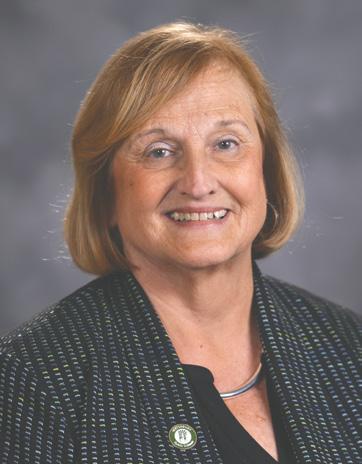
AREA DIRECTORS
Marion Manzo | Area 1 Director, Region 15
Douglas Foyle | Area 2 Co-Director, Glastonbury
Tyron Harris | Area 2 Co-Director, East Hartford
Jay Livernois | Area 4 Director, Woodstock Academy
Dan Cruson | Area 5 Director, Newtown
Janice Cupee | Area 6 Co-Director, Stratford
Lee Goldstein | Area 6 Co-Director, Westport
George Kurtyka | Area 7 Co-Director, Derby
Robert Guthrie | Area 7 Co-Director, West Haven
Lon Seidman | Area 8 Director, Essex
Carol Burgess | Area 9 Co-Director, Montville
Bryan Doughty | Area 9 Co-Director, New London
ASSOCIATES
Eileen Baker | Associate, Old Saybrook
Ann Gruenberg | Associate, Hampton
Anthony Perugini | Associate, Cheshire
Robert Mitchell | Associate, Montville
Joseph Wilkerson | Associate, Bloomfield
COMMITTEE CHAIRS
Becky Tyrrell | Chair, Federal Relations, Plainville
Ethel Grant | Chair, Resolutions, Naugatuck
Jaime Barr Shelburn | Chair, State Relations, East Lyme
CITY REPRESENTATIVES
A. J. Johnson | City Representative, Hartford
Yesenia Rivera | City Representative, New Haven
Versha Munshi-South | City Representative, Stamford
STAFF
Patrice McCarthy | Executive Director and General Counsel
Nicholas Caruso | Senior Staff Associate for Field Services and Coordinator of Technology
Jody Goeler | Senior Staff Associate for Policy Service
Sheila McKay | Senior Staff Associate for Government Relations
Lisa Steimer | Senior Staff Associate for Professional Development and Communications
Conrad Vahlsing | Senior Staff Attorney
Wendy DeBarge | Coordinator of Finance and Administration
Pamela Brooks | Senior Administrative Associate for Policy Service and Search Services
Terry DeMars | Administrative Associate for Policy Service
Gail Heath | Administrative Associate for Government Relations
Wilmarie Newton | Administrative Associate for Digital Communications
Nancy Propfe | Administrative Assistant for Membership Services
Corliss Ucci | Receptionist and Assistant to Executive Director CABE Journal (ISSN 1092-1818) is published bi-monthly by Connecticut Association of Boards of Education, 81Wolcott Hill Road, Wethersfield, CT 06109. Periodicals postage Paid at Hartford, CT.”
POSTMASTER: Send address changes to The CABE Journal, CABE, 81 Wolcott Hill Road, Wethersfield, CT 06109-1242. CABE membership dues include $30 per person for each individual who receives The CABE Journal. The subscription rate for nonmembers is $75. Association members dues include a subscription for each Board Member, Superintendent, Assistant Superintendent and Business Manager. The companies and advertisements found in The CABE Journal are not necessarily endorsed by CABE.
2 The Journal – Connecticut Association of Boards of Education | April, 2023
Elizabeth Brown President, CABE
CABE Immediate Past President Donald Harris, Jr. discussed Alvin Woods, the first Black principal in Hartford who also served on the Board of Trustees for the State University system. He was also the first Black member of the Bloomfield Town Council.
CABE Affiliate Members
BUSINESS AFFILIATES
VALEDICTORIAN
Connecticut Business Systems –
A Xerox Company
Finalsite
SALUTATORIAN
Berchem Moses PC
Shipman & Goodwin
HIGH HONORS
Pullman & Comley
HONOR ROLL
JCJ Architecture
Kainen, Escalera & McHale, P.C.
Newman/DLR Group
SCHOLAR
Brown & Brown
Chinni & Associates, LLC
Coordinated Transportation Solutions
Dattco, Inc.
ESS
Franklin Covey
The Lexington Group Perkins Eastman
Public Agency Retirement Services (PARS)
The S/L/A/M Collaborative
Zangari Cohn Cuthbertson
Duhl & Grello, P.C.
EDUCATIONAL AFFILIATES
American School for the Deaf Area Cooperative Educational Services (ACES)
Booker T. Washington Academy
Cambridge International
Capitol Region Education Council (CREC)
Connecticut Alliance of YMCAs
Connecticut Arts
Administrators Association
Connecticut Association of School Business Officials (CASBO)
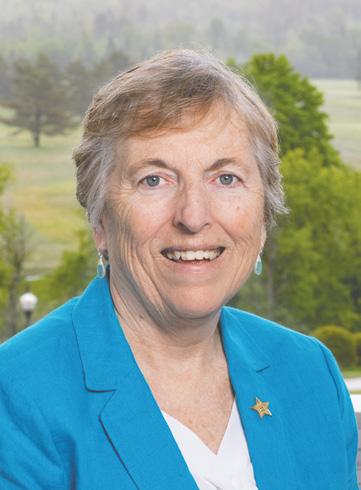
Connecticut School Buildings and Grounds Association (CSBGA)
Connecticut School Counselor Association
Connecticut Technical High Schools
Cooperative Educational Services (C.E.S.)
EASTCONN
EdAdvance
Explorations Charter School
Great Oaks Charter School
Integrated Day Charter School
ISAAC
LEARN
Live Girl
Odyssey Community School, Inc.
Relay CT
The Bridge Academy
A Budget Prioritizing Student Needs is Conducive to Growth
Patrice McCarthy Executive Director & General Counsel, CABE
As Spring begins we look forward to a season of growth and renewal. Thoughts turn to planting our gardens. We know plants need multiple elements to thrive – nutrients, sun, water, strong roots and attention.
These same elements are critical to the growth and renewal of students, staff and school boards. The school district budget provides important nutrients – resources to support professional development, address social and emotional needs, and accelerate learning. Like good soil, a budget that prioritizes student needs is conducive to growth.
Celebrating the accomplishments
of students, staff and the board provides the sunlight necessary for continued growth. Acknowledging success inspires further efforts, and allows the community to share in the accomplishments of the school district.
Water is an essential element to sustain our gardens. Effective leadership by the board of education and superintendent nurtures the district. Like water, leadership must be consistent and responsive to all the conditions impacting students, staff and the board.
Attention to the needs of students, staff, the board – and plants – allows them to thrive. We know that changing circumstances - like a pandemic – requires us to adjust our
priorities. Continuous monitoring of data allows boards of education to address district needs by reallocating resources.
When all of these elements are present, our gardens and our students will flourish. The strong roots they develop will sustain them and support their resilience as they address new challenges and learning opportunities. As school boards work with their superintendents to finalize budget priorities, I hope you are able to include all the elements necessary to support your students and staff.
The Journal – Connecticut Association of Boards of Education | April, 2023 3 EXECUTIVE DIRECTOR COMMENTARY
2023 CABE/CAPSS Convention Dates Announced! Friday, November 17 Saturday, November 18 Mystic Marriott Hotel, Groton Join us as we learn together! Leading from Why
See You in Court – The Nutmeg Board of Education Angry Al’s Interactions with Staff: Cause to Be Banned from School Property?
Thomas B. Mooney, Esq. Shipman & Goodwin
The Nutmeg Board of Education makes many mistakes. The latest imbroglio created by the board will be reported here each issue, followed by an explanation of what the board should have done. Though not intended as legal advice, these situations may help board members avoid common problems.
The members of the Nutmeg Board of Education were used to an irascible public, but one parent whom they call “Angry Al” has them worried. Al is always mad about something, and he stridently shares his displeasure with anyone who will listen.
Al is familiar to the Board members. A regular at Board meetings, Al regularly speaks during public comment to express his displeasure with something that the Board, the Superintendent, or others have done. The real problem, however, has been Al’s interactions with staff. The parent of a high school freshman, Al argues frequently with the staff at Nutmeg Memorial High School, and Ms. Superintendent has been worried about their safety.
Just last week, Al confronted Mr. Principal about a new rule requiring parents to park in designated areas if they come on to school property to pick up their children. “Why do you get to have your convenient parking place near the entrance, but I have to park far away?” Al asked Mr. Principal. Mr. Principal tried to deescalate the situation by explaining that there is only limited parking at the high school and that it is necessary to keep the front of the school clear for buses at dismissal. But Al just got more elevated in tone and invaded Mr. Principal’s personal space, yelling that, since he is a taxpayer, Mr. Principal works for him and should listen to his “boss.” Staff members and students in the area watched this conflict escalate, and the school resource officer stepped in. However, that just set Al off further, and he continued to cause a disruption until the school resource officer arrested him for breach of the peace.
Unfortunately, that was not the first time that Al’s belligerent attitude got him arrested. When his son was suspended for insubordination earlier in the year, Al demanded a meeting with the assistant principal, and the meeting did not go well. Al angrily accused the assistant principal of tar-
geting his son. The conversation went downhill from there, and it ended when Al shoved the assistant principal and was arrested by the school resources officer for assault as well as breach of the peace.
Ms. Superintendent is so concerned that Al is a danger that she brought her concerns to the Nutmeg Board of Education last night in executive session under the agenda item, “Discussion concerning a parent matter.” As usual, Al was in the audience, and during public comment at the beginning of the meeting, he loudly questioned whether this agenda item had to do with him. “I know my rights,” Al told the Board members. “If you are going to talk about me or my son, I demand that you hold the discussion in open session!”
Neither the Board members nor Ms. Superintendent responded to Al’s question, and at the end of the meeting the Board convened with Ms. Superintendent in executive session. Ms. Superintendent explained that things were going from bad to worse with Al and that she was going to ban him from school property and all school activities.
Board member Mal Content asked Ms. Superintendent whether she needed a Board vote, and Ms. Superintendent said no. She told the Board members that banning Al from school property is an operational concern within her jurisdiction, an action that she can take without Board action. However, she explained that she didn’t want the Board members to be surprised if and when Al sues the district over the ban.
Is Ms. Superintendent within her rights to update the Board in executive session and to ban Al from school property?
••••••••••••
As the chief executive officer of the Board of Education, the Superintendent has operational control over the school district (subject to related Board policies), and that control includes the right to grant and deny access to school property. By contrast, Al has no say over whether the Board discusses him or his son in executive session. Here, Ms. Superintendent’s actions were appropriate, and she has the right to proceed with her plan.
Given that some parents are confrontational and disruptive, school officials have taken action on occasion to limit parent access to school property. The courts have reviewed such actions,
ruling that parent access to school property can be limited for legitimate reasons as long as such action is not in retaliation for the parent’s exercise of their free speech rights.
The leading case in Connecticut is Johnson v. Perry, 859 F.3d 156 (2d Cir. 2017). There, the Second Circuit Court of Appeals considered a motion for summary judgment by a high school principal seeking dismissal of a complaint by a parent that the principal had violated his rights by banning him from school property and all school activities. The court found that a general ban from school property was within the principal’s authority. However, the court held that further proceedings were necessary to determine whether the ban from school events was reasonable, and thus permissible, or whether it was improper retaliation for the parent’s complaints, which are protected by the First Amendment.
From this case, we understand that school officials have the general authority to ban parents from school property when they have a reasonable basis for doing so. The question in Johnson v. Perry was whether the principal’s ban was based on the parent’s
actions or whether it was in retaliation for protected speech. Here, Al could make the same claim. Al regularly criticizes the Board and Superintendent during public comment at Board meetings, and he could well argue that Ms. Superintendent’s actions were retaliation for such speech. When parents have been physically aggressive, however, the courts have been willing to affirm actions banning them from school property. Al’s actions here, including aggression and disruption to the point of arrest, would justify the action proposed by Ms. Superintendent and rebut any such claim of retaliation.
This situation also raises two issues under the Freedom of Information Act. The FOIA requires that the agenda for meetings of public agencies fairly apprise the public of the business to be transacted. Here, one might reasonably ask whether “Discussion concerning a Parent Matter” meets this standard. However, under the Family Educational Rights and Privacy Act (FERPA), personally-identifiable information concerning students may be kept confidential, and parent names
Ninth Edition A Practical Guide to Connecticut School Law
by Thomas B. Mooney, Esq. Shipman & Goodwin
CABE is delighted to announce that the Ninth Edition of Tom Mooney’s Practical Guide to Connecticut School Law is now available.
PRICING: CABE Members: $54.99; CABE Non-Members: $79.99; Students: $44.99
There have been many changes in school law in the last few years, and the Ninth Edition has been extensively revised to provide updated guidance on the legal issues that govern our schools. Changes include descriptions and commentary on:
• Changes in teacher evaluation and teacher tenure.
• New rules regarding employee background checks.
• New requirements concerning student data privacy.
• New rules for suspension, expulsion and alternative educational opportunities.
• Revised requirements governing seclusion and restraint.
• The new “Every Student Succeeds Act” and how it has changed “No Child Left Behind Act” requirements.
• The CCJEF case and ongoing litigation over equal educational opportunities.
• The Minimum Budget Requirement and new duties to collaborate with town officials.
• A host of other changes in the rules that boards of education and school administrators must follow.
4 The Journal – Connecticut Association of Boards of Education | April, 2023 See SEE YOU IN COURT page 8
It’s Personal
Relationships fuel success. We earn your trust by taking your success as personally as you do. However you define value, Shipman delivers.
Shipman’s school law lawyers have over 50 years of experience, and represent over 100 public school districts, as well as public school member organizations and associations, on the broad range of legal issues that school districts confront. We call on lawyers experienced in school law, special education, employment law, labor relations, intellectual property, data privacy, construction and environmental issues, and business contracts to provide effective and efficient legal assistance for our clients.
It all adds up to a relationship that delivers added value for each of our school district clients. Our Practice Group Co-Chair, Tom Mooney, has written

teachers, administrators and board of education members throughout

The Journal – Connecticut Association of Boards of Education | April, 2023 5
Education is a core focus of our law firm. www.ctschoollaw.com Contact: Thomas B. Mooney , Jessica L. Ritter or Julie C. Fay | 860.251.5000
Connecticut
law,
by CABE and used by
Connecticut | New York | www.shipmangoodwin.com Shipman & Goodwin LLP
A Practical Guide to
School Law, a comprehensive treatise on Connecticut school
published
the state.
CABE: Working for YOU
Individualized Workshops | Professional Development Opportunities Legal Services | Policy Services | Representing You Statewide and Nationally
Below are the highlights of activities that the CABE staff has undertaken on your behalf over the last month. We did this:
By providing opportunities for members to learn how to better govern their districts:
z Responded to 72 requests for policy information from 41 districts, providing sample materials on policy topics. Further, districts continue to access CABE’s online Core Policy Reference Manual and/or online manuals posted by CABE for policy samples. The topics of greatest interest were those pertaining to Electronic Board Meetings, Homeschooling, and Paraeducator Professional Development.
z Provided support to board members and central office administrators regarding policy matters.
By attending Professional Development to strengthen staff knowledge and skills:
z Attended webinar by FranklinCovey entitled, “Building a HighTrust Boardroom”.
z Participated in New England School Public Relations Association (NESPRA) Member Check-In.
By providing services to meet member needs:
z Provided webinar in preparation for CABE Lobbying Day.
z Responded to a variety of legal inquiries from members.
z Revised policies, as part of the Custom Update Policy Service, for East Windsor, Newington, North Stonington Public Schools, and The Gilbert School
z Prepared materials, as part of the Custom Policy Service, for Brookfield and Region #14 Public Schools.
z Currently assisting Canterbury, East Hartford, and Granby Boards of Education with their superintendent searches. Additionally, assisting Preston Public Schools with a Middle School Principal search.
z Facilitated a board self-evaluation for the Stafford Board of Education.
z Provided webinar on the African American/Black and Puerto Rican/ Latino course of study.
z Facilitated CABE Book Club conversation about The Innovator’s Mindset by George Couros.
By helping school boards to increase student achievement:
z Sent three issues of “Policy Highlights” via e-mail listserv
covering topics that affect student achievement. Topics pertained to Youth Suicide Prevention 988 Hotline and Homelessness - “No Matter What” Campaign, New Data on Home Visits – Ability to Reduce Absenteeism.
By promoting public education:
z Participated in Representation Matters program to promote school board service.
z Participated in CABE Diversity, Equity and Inclusion meeting.
By ensuring members receive the most up-to-date communications:
z Provided webinar on Governor’s Budget.

By helping districts operate efficiently and conserve resources:
z Facilitated Board Chair Check-In.
z Posted policies online, as part of the C.O.P.S. Program for Avon, Barkhamsted, Bolton, Chaplin, Cheshire, Derby, Griswold, ISAAC, Monroe, New Fairfield, Norfolk, Preston, Ridgefield, and Somers Public Schools and the CABE Core Manual.
CABE ON THE HILL
By representing Connecticut school boards on the state or national level:
z Provided legislative update at CREC Council meeting.
z Participated in CABE/CREC/HASA legislative forum.
z Participated in CT Education Partners meeting.
z Participated in Social Emotional Learning Collaborative meeting.
z Participated in RESC Alliance legislative discussion.
z Attended “Call Their Names” program for Black History month.
z Attended CAS Board of Directors meeting.
z Participated in Minority Teacher Recruitment Committee meeting.
z Participated in NSBA State Counsel meeting.
z Attended meeting of the Connecticut Commission for Educational Technology.
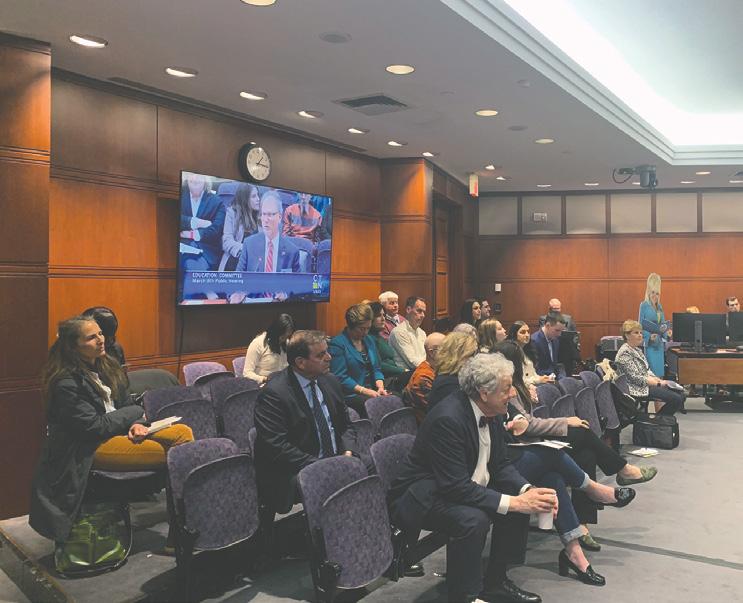
z Attended meetings of the Ship Committee, Education Committee and Board of Directors for Discovering Amistad
z Participated in State Association Convention Managers meeting.
z Participated in NESPRA Annual Conference planning and Budget Committee meetings.
6 The Journal – Connecticut Association of Boards of Education | April, 2023
Windsor Board Chair David Furie testified before the Education Committee on March 8 in support of mandating school board orientation..
CABE Secretary/Treasurer Lon Seidman (Essex) testified before the Education Committee on February 22 in support of expediting the 10 year phase-in of the bipartisan ECS grant.
Establish a Board/Superintendent Mission Statement
A number of years ago, I attended a conference of school board trainers and out of that meeting, through a huge misunderstanding, I found a really neat way to help boards and superintendents work better together.
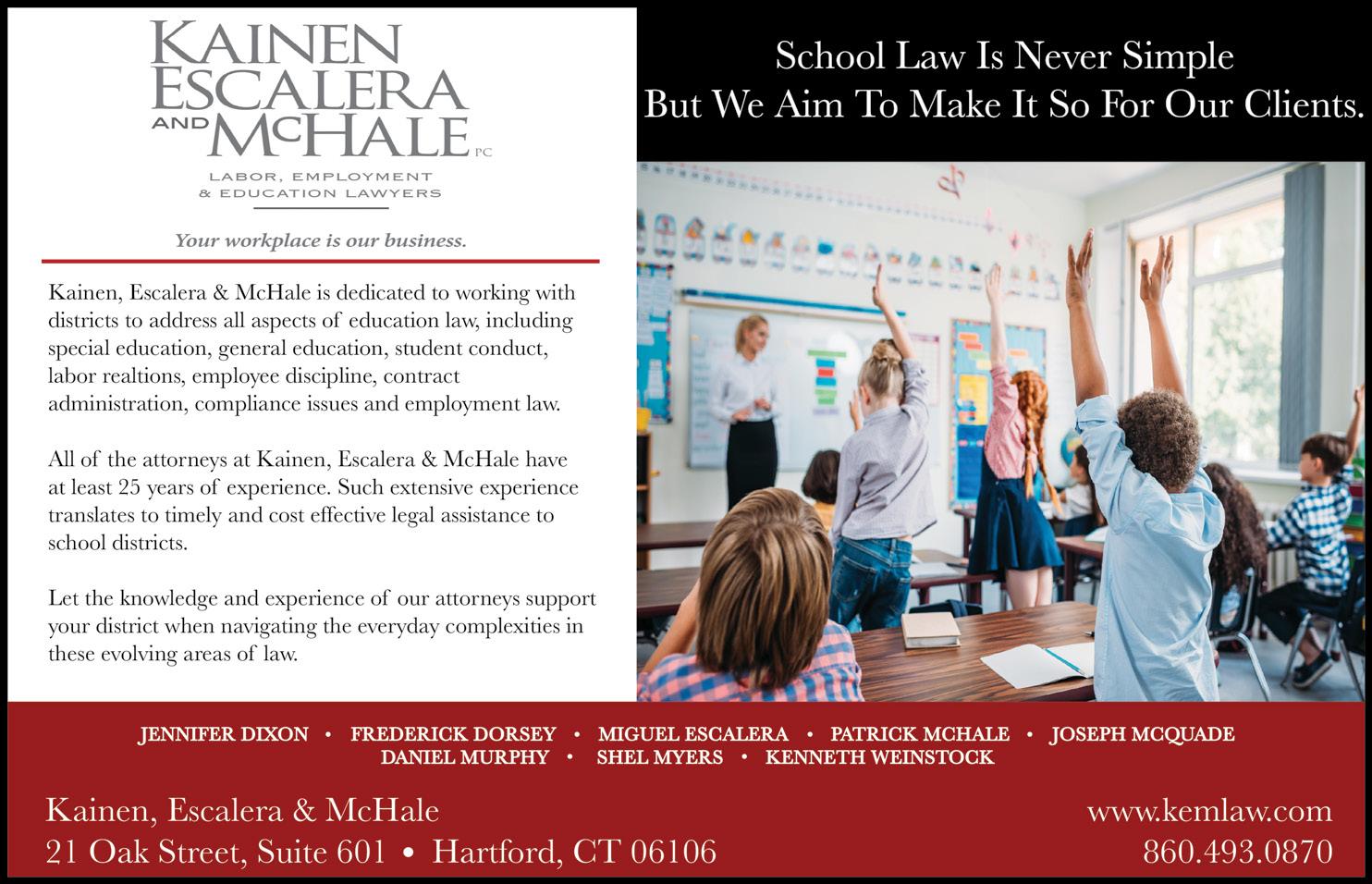
At that conference, I heard one of my colleagues talk about the work he did to help his boards create Board/ Superintendent Mission Statements He was referring to the practice of the board of education working with the superintendent to create a district mission, but what I heard was that the board and superintendent created a TEAM mission statement articulating their working relationship. I had one of those epiphanies that make my work so inspiring!
Upon my return to Connecticut I was soon approached by a board chair who mentioned that they had just hired a new superintendent and she wanted to hold a board retreat so that they could all start off on the best
foot forward. I suggested that we work through a process that established a Board/Superintendent Mission statement. I explained my idea and the process I would use, with the understanding that I had no idea if we would actually create such a document, but promised the conversation would put them all in a good place.
At the start of the retreat, I explained what we were going to attempt. I then put up four sheets of chart paper. The first was labeled “Board”, the second, “Superintendent”, followed by “Team” and “?” to catch any ideas we weren’t sure about.
The question was a simple one, “In governing the district, who does what?”
We spent about 45 minutes brainstorming different ideas about various responsibilities of each part of the team. After getting clarity in what each of the tasks represented, we placed them on the appropriate chart and moved question-marked ideas into more appropriate categories.
After a few minutes of general
conversation about this work, I broke up the team into three groups, gave each of them one of the sheets of chart paper (Board, Superintendent and Team) asking each team to draft a statement about their respective group. It could be a sentence, a paragraph or a list of bulleted items, but to focus on articulating the “Mission” of that particular entity. The only caveat I placed on the group was that the superintendent could not sit in the “Superintendent” group. I gave them 40 minutes to come up with a draft and then wandered the room, observing the work. There was lively conversation in all three groups.
After returning to the large group, each team reported out their findings and we spent some time giving the combined ideas “One Voice”, so that it was a cohesive document that flowed like it had been written by one group. I was really impressed with their results. What resulted was a clear articulation of the responsibilities of the team, the board and superintendent, in one very concise document.
I’ve used this exercise several times since, but have always been impressed by the great ideas these teams come forward with.
In one case, 20 years after the board had written their statement, that district’s current board chair pulled it out at a board retreat and stated, “I don’t know where this came from, but it is really brilliant.” It was fun to be able to rely, “I can tell you exactly where that came from!”
Conflict between boards and superintendents often comes about when the delineations between roles are not clearly understood. CABE Immediate Past President, Donald Harris reminds us all to “stay in your lane!” A tool like this can make it easier to do so.
If you are interested in learning more about this workshop, sample mission statements or any other board professional development, contact Nick Caruso at ncaruso@cabe.org
The Journal – Connecticut Association of Boards of Education | April, 2023 7
Nick Caruso
Sr. Staff Associate for Field Services and Coordinator of Technology, CABE
Board Meetings: Be Careful What You Say When the Cameras Are Rolling (Even During a Recess)
Conrad Vahlsing Senior Staff Attorney, CABE

What board members say during a meeting’s recess may be memorialized and accessible to the public if recorded. As a cautionary tale, the Connecticut Freedom of Information Commission recently concluded that a full, unedited recording of a town’s Planning and Zoning Commission meeting must be disclosed to a requester.
There are several important details to note. First, the meeting was conducted in a hybrid format (it included both in-person and remote access). Second, the P&Z Commission recorded the meeting, including portions of a recess, and this recording was kept on file with an IT Department. And third, the P&Z Commission posted an edited version of the recording online, with portions of the recess redacted.

Now for the cautionary-tale part. After the town’s P&Z Commissioner announced a recess in the meeting, the Town Planner’s microphone was still on (you can see where this is going), the recording captured negative comments she made about a person, and that person ended up filing a Freedom of Information Act request for the full, unedited video.
The FOI Commission concluded that the unedited video must be disclosed, and found that none of the P&Z Commission’s excuses for not disclosing the video were persuasive. Outlining some of the attempted excuses may be informative for boards hoping to avoid being in a similar situation.
The P&Z Commission attempted to argue that the recess portions of the video do not relate to the public’s business and are therefore not required to be disclosed. The FOIC had a host of reasons that was not persuasive, including that:
• the comments were captured by the P&Z Commission’s own equipment, at the meeting location
• the person speaking was the Town Planner, who assists the P&Z Commission
• the person the Town Planner was speaking to was another staff member who assists the P&Z Commission
• a member of the P&Z Commission was in the vicinity of the conversation
• the person who was the subject of the negative comments was a developer who regularly appeared before the P&Z Commission to speak on land use issues
The P&Z Commission also attempted to argue that it could redact the negative comments under the FOIA disclosure exemption for “strategy and negotiations with respect to pending claims or pending litigation.” See FOIA, Section 1-210(b)(4). This defense was related to the fact that the subject of the negative comments allegedly threatened legal action, and therefore the argument was that redacting the comments with an edited video was an attempt to mitigate dam-
age from future litigation.
The FOI Commission dismissed this argument, in part, by noting that the Town Planner’s redacted comments themselves were not strategy or negotiations pertaining to pending claims or litigation. There are two important points here. First, the FOI Commission is noting the fact that the content of the redactions should involve strategy or negotiations related to pending claims or litigation, not the decision to redact. Second, our state FOIA has specific definitions of what is a pending claim and what is pending litigation, and an attempt to use this exemption must align with those definitions (your board attorney will be well-versed in the definitions).
As a final, related note, the fact that the meeting was hybrid is worth mentioning because under our current
remote meetings laws, a recording (or a transcription) of a meeting is only required when the meeting is a fully-virtual, regular meeting. But whether recording a meeting is required is a separate issue from a FOIA records request. If a district chooses to record its board meeting and keep the recording on file, then that recording will likely be considered public records. And therefore, that recording will be subject to disclosure unless a FOIA exception applies to portions of the content.
For further reading, the FOI Commission decision is Drapers v. Town of Bethel, #FIC 2022-0148 (February 8, 2023). The remote meetings laws, aside from the FOIA, are contained in Public Acts 21-2 (June Special Session) and 22-3.
are considered such confidential information under FERPA. Given that the discussion related to Al’s actions as a parent, it was permissible for the Board not to include Al’s name on the public agenda.
Finally, Al claimed that he had the right to demand that any discussion of him as a parent be held in open session. He is wrong, and he may be mistakenly applying another FOIA provision to this situation. Under the FOIA, public agencies are permitted to discuss personnel matters in executive session, provided that the individual being discussed does not require that such discussion be held in open
session. Discussion of student matters contained in school records, including interactions with their parents, by contrast, is separately privileged to executive session as a discussion that would result in the disclosure of information in confidential records. If concerns about Al’s actions and his potential ban from school property are included in school records, the Board’s discussion in executive session was proper.
Attorney Thomas B. Mooney is a partner in the Hartford law firm of Shipman & Goodwin who works frequently with boards of education. Mooney is a regular contributor to the CABE Journal. Shipman & Goodwin is a CABE Business Affiliate.
8 The Journal – Connecticut Association of Boards of Education | April, 2023
MARY BRODERICK, ED.D SENIOR CONSULTANT Current Vacancies: Superintendent of Schools: CANTERBURY PUBLIC SCHOOLS GRANBY PUBLIC SCHOOLS Middle School Principal: PRESTON PUBLIC SCHOOLS For more information contact CABE Search Services 81 Wolcott Hill Road, Wethersfield, CT 06109 860-608-1763 Equal Opportunity Employer
SEE YOU IN COURT (continued from page 4)
THE POLICY CORNER ChatGPT – Advantages and Limitations
Jody Goeler Sr. Staff Associate for Policy Service, CABE
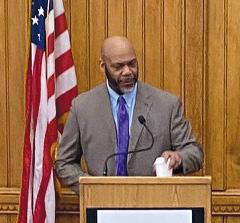
As ChatGPT continues on its developers’ mission to “to ensure that artificial general intelligence benefits all of humanity”, the tool has continued to succeed in its coursework earning a Bon the AP Lit essay, passing law exams in four courses at the University of Minnesota and one at the University of Pennsylvania’s Wharton School of Business and scoring in the 52nd percentile on the math, reading and writing portions of the SAT. Having demonstrated its academic prowess, ChatGPT, set its sights on the future, passing the Google coding interview for a level three engineer position. Ever the social climber, ChatGPT participated in a lengthy interview with New Yorker magazine, where it asserted, “It’s not possible for me to feel or be creepy.” ChatGPT indeed appears to be everywhere these days.
Nonetheless, educators remain concerned with the AI’s ability to assist students with cheating. Education Week (February 14, 2023), in an article on ways to “Outsmart Chat GPT: 8 Tips for Creating Assignments It Can’t
Do”, Alyson Kline offers educators the following:
• Ask students to write about something deeply personal.
• Center a writing assignment around an issue specific to the local community.
• Direct students to write about a very recent news event.
• Have students show or explain their work.
• Ask students to give an oral presentation, along with written work.
• Return to a pre-digital age and ask students to handwrite their essays in class.

• Put project-based learning to work.
• Run the assignment through ChatGPT before giving it to students.
As one would expect, ChatGPT’s presence on the landscape has (and will continue to) open the door for a variety of cottage industries to catch cheating and will continue to challenge educators to develop lessons and
CREC/HASA/CABE LEGISLATIVE FORUM – FEBRUARY 16, 2023
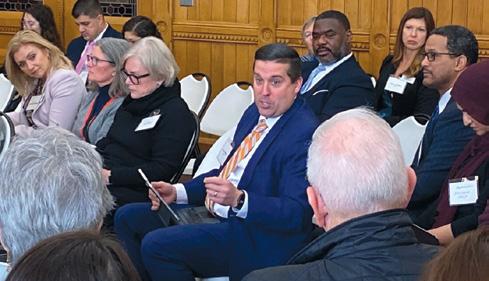
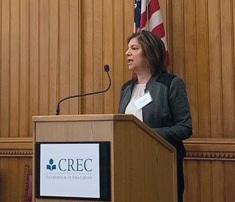
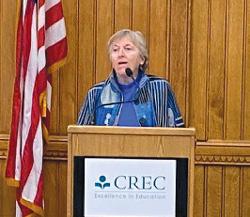
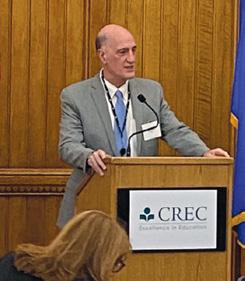
assessments that render chat bots and the family of large language model AI tools, such as ChatGPT, only a tool to “benefit all of humanity” as it were.
Perhaps most important is to begin preparing ourselves with tools to guide boards of education on the appropriate use and applications of artificial intelligence. As CABE continues its work on developing a model policy to help districts, Iowa universities issued useful guidance that may assist on ways to take advantage of ChatGPT and how to guard against its limitations and potential harms.
As one can imagine, university instructors are among those who share different views regarding the use of AI in their classes. With this in mind, according to their online newsletter, govtech.com, Iowa’s universities’ guidance provides model language to assist in setting expectations up front to students. For example, instructors
wanting to ban the use of AI could list it among academic integrity violations: “Since writing, analytical, and critical thinking skills are part of the learning outcomes of this course, all writing assignments should be prepared by the student. Therefore, AI generated submissions are not permitted and will be treated as plagiarism.”
Iowa State issued guidance language to professors who wish to incorporate AI into their coursework and assignments: “It’s allowed with appropriate attribution.” “It’s allowed in limited instances.” “AI can be used to prepare for assignments by brainstorming, but students must show how it helped the reach the result” Setting expectations up front appears to be a strategy all can agree on at this point. In the meantime, look for a ChatGPT story in your favorite media source 24/7.
The Journal – Connecticut Association of Boards of Education | April, 2023 9
Greg Florio, CREC Executive Director welcomes participants.
CREC Council Chair, CABE Past President, and NSBA Northeast Region Representative Lydia Tedone (Simsbury) welcomed participants.
CABE Executive Director and General Counsel, Patrice McCarthy discusses CABE’s legislative priorities.
Senator Douglas McCrory, Education Committee Co-Chair spoke about education issues before the Committee this session. Southington School Superintendent Steve Mandancy, shared the impact legislation has at the local level.
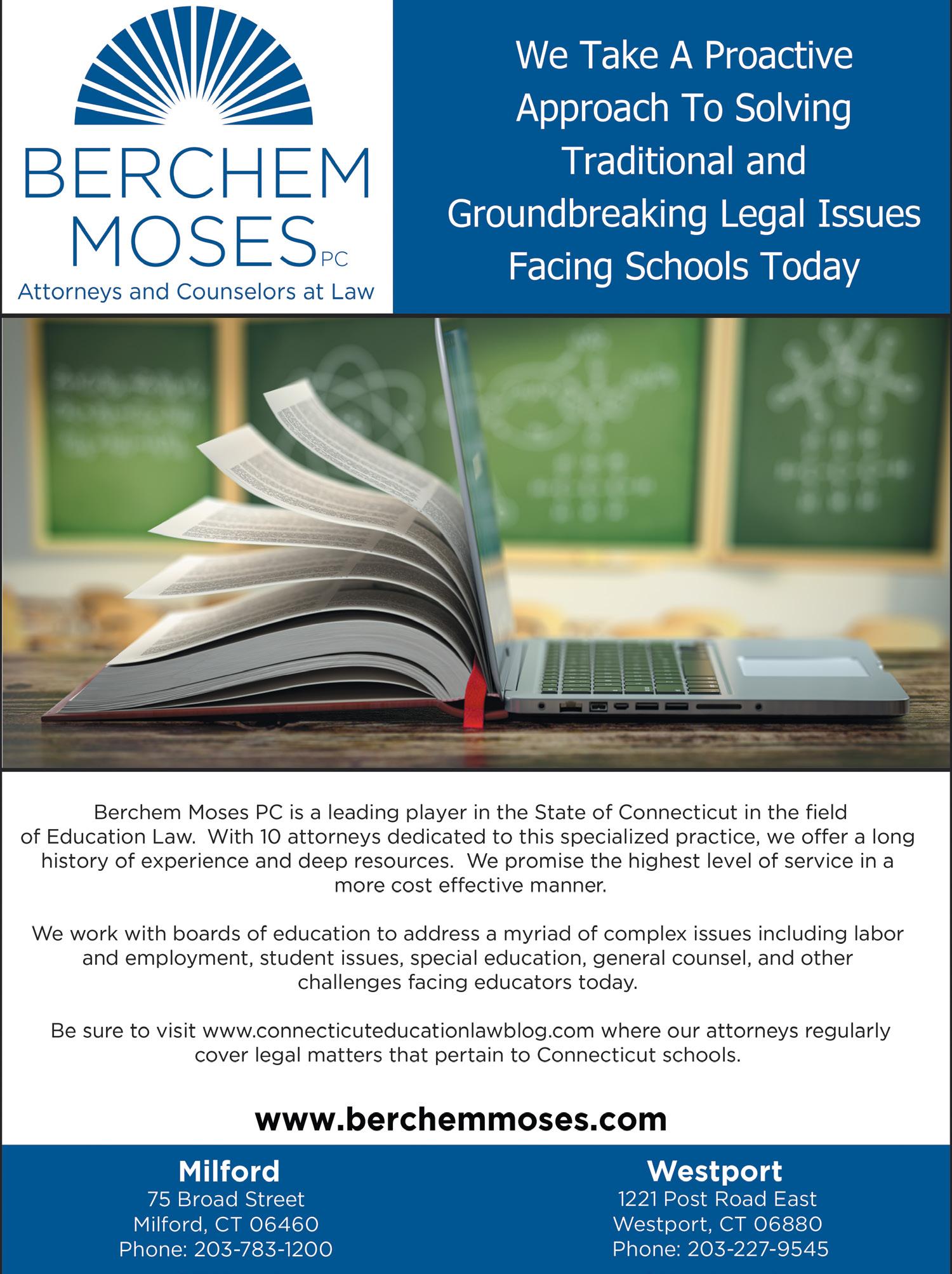
10 The Journal – Connecticut Association of Boards of Education | April, 2023
CABE LOBBYING DAY – MARCH 8, 2023

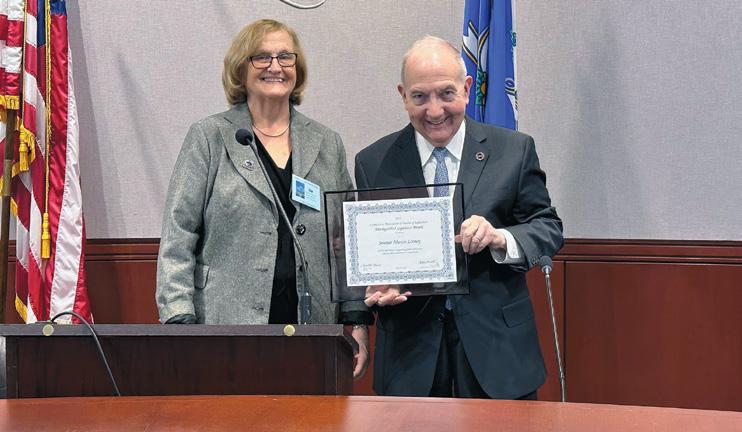
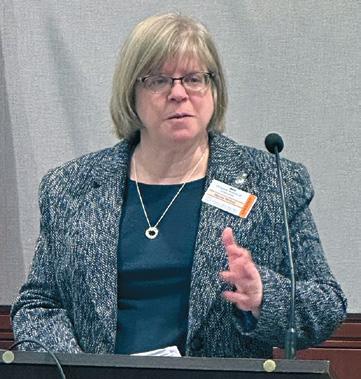
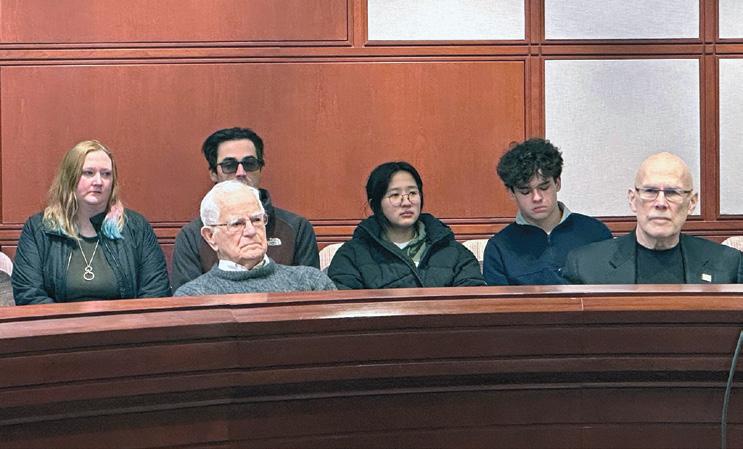

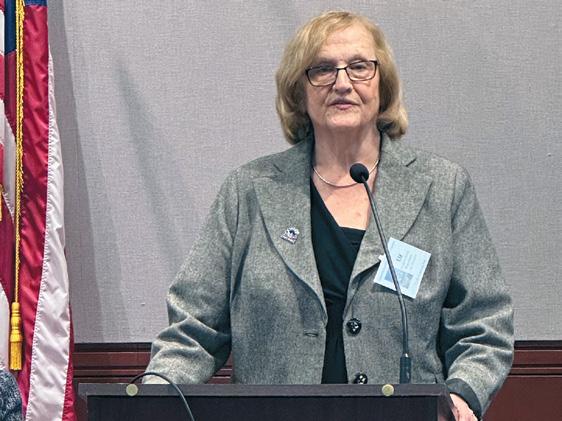
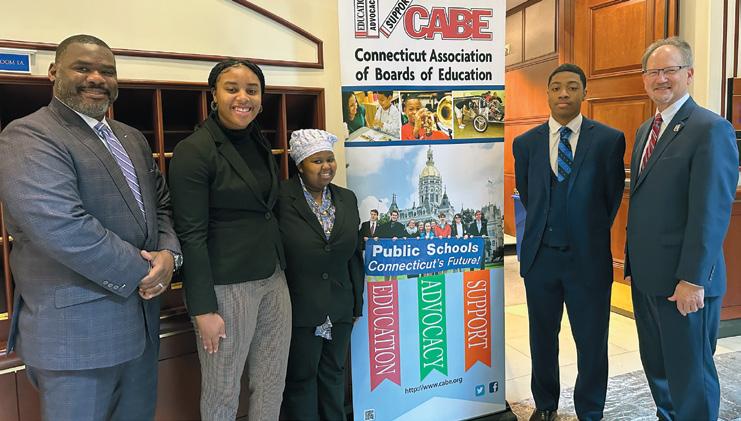

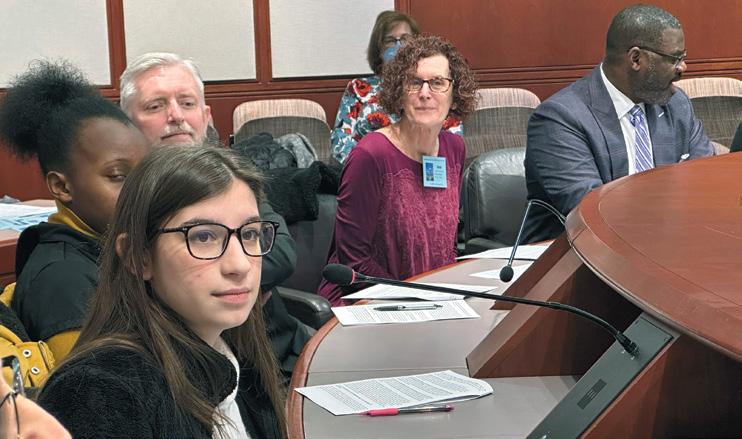
The Journal – Connecticut Association of Boards of Education | April, 2023 11
Students from Waterbury were accompanied by Board Chair Ann Sweeney and Board members Thomas van Stone and Liz Brown (CABE President).
Windsor Public School students and Board Chair David Furie and Superintendent Dr. Terrell Hill
Waterbury students and Board Chair Ann Sweeney and Board members Thomas van Stone and Liz Brown (CABE President).
CABE President Liz Brown (Waterbury) welcomed participants.
CABE Executive Director and General Counsel Patrice McCarthy and Sr. Staff Associate for Government Relations Sheila McKay provided an update on the legislative session.
CABE Sr. Staff Associate for Government Relations Sheila McKay engaged students from Branford, Waterbury and Windsor
CABE recognized Senator Martin Looney with the CABE Distinguished Legislator Award because of his work leading to the increase of special education excess cost reimbursement grant during the 2022 Legislative session.
Windsor students were accompanied by Board Chair David Furie, Board member Leonard Lockhard (CABE First Vice President), and Superintendent Dr. Terrell Hill
Branford students were accompanied by Board Member John Prins (CABE VP for Professional Development). Also pictured is longtime Willington Board Member Herb Arico
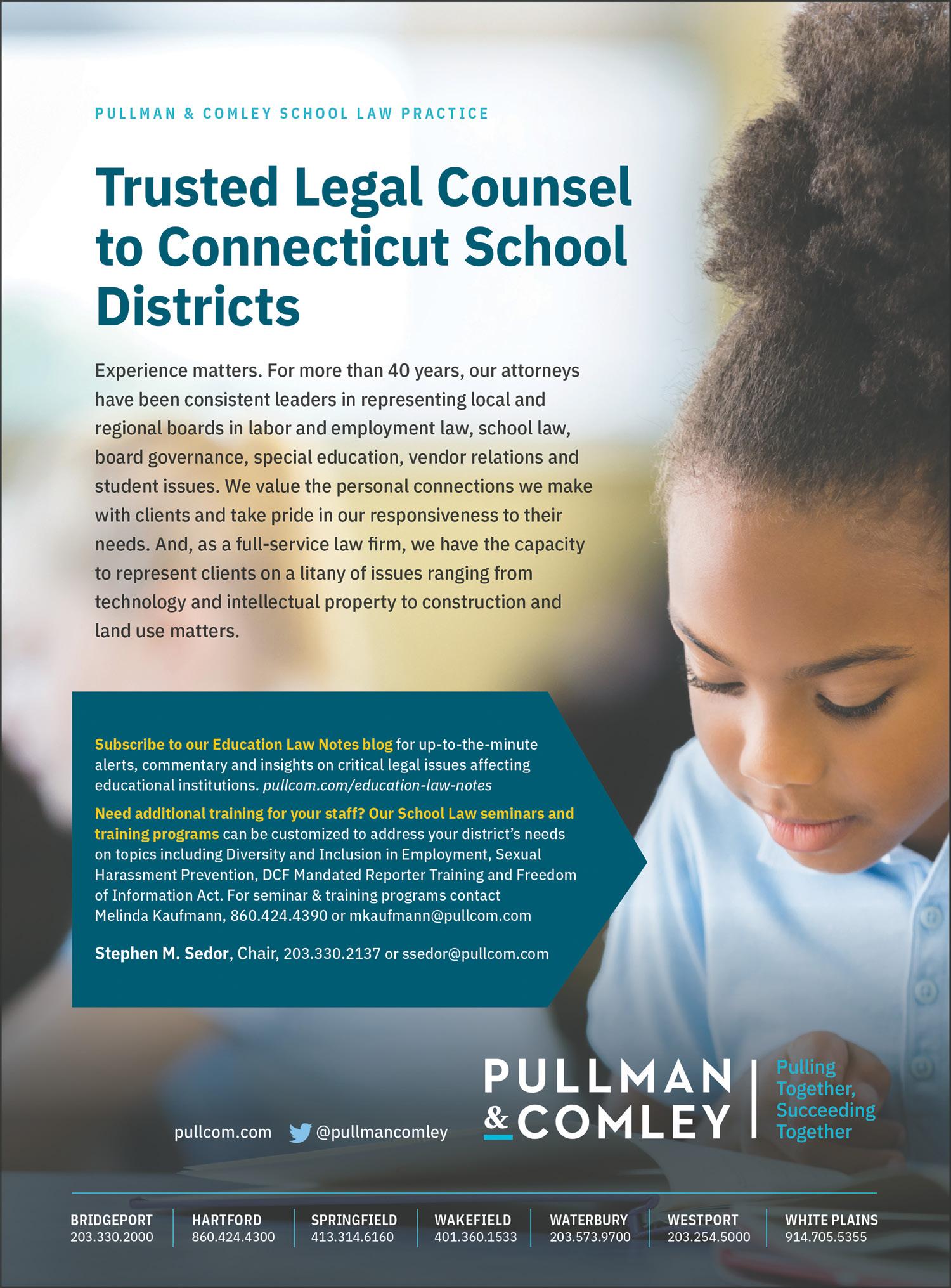
12 The Journal – Connecticut Association of Boards of Education | April, 2023































